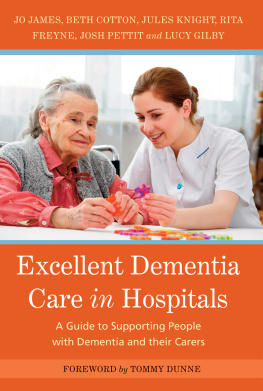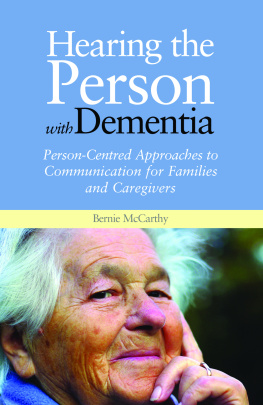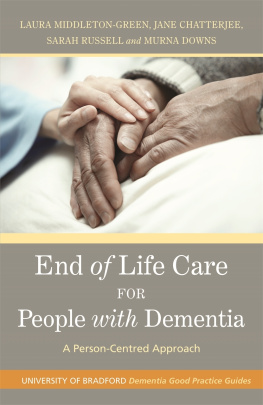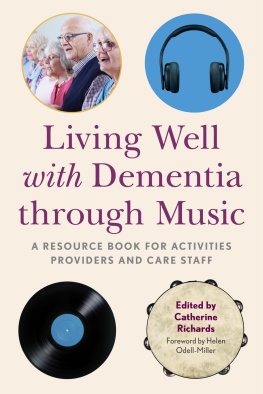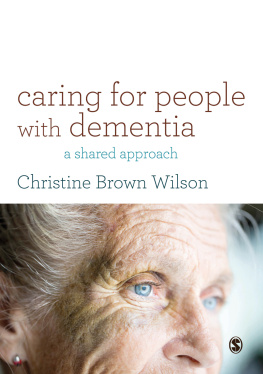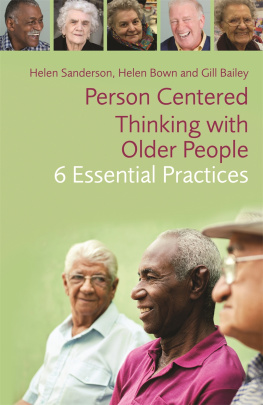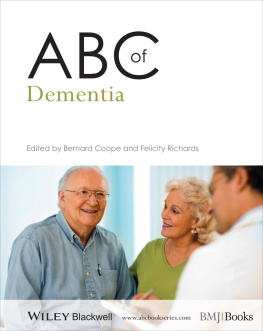
Excellent Dementia
Care in Hospitals
A Guide to Supporting People
with Dementia and their Carers
Jo James, Beth Cotton, Jules Knight,
Rita Freyne, Josh Pettit and Lucy Gilby
With contributions by Nicci Gerrard and Julia Jones
Foreword by Tommy Dunne

Jessica Kingsley Publishers
London and Philadelphia
Contents
Royalties from this book will be
donated to the Imperial Charity.
Foreword
Tommy Dunne
For too long there has been a need to equip healthcare professionals with the right knowledge and approach to be able to provide my peers (those living with dementia) and our carers with the very best possible care.
But how can you really provide care for someone if you dont fully understand the needs of those who require that care? After all, there are no manuals detailing case studies or the different scenarios that may occur.
You cant teach empathy, but you can teach people how to understand the needs of others and, from that, empathy can be born. Unfortunately, for too long there has been a care system in place of one size fits all. At present there is nothing outside the norm to give guidance to health professionals about the different scenarios that they may face when dealing with people with dementia.
Behavioural problems in people with dementia are always triggered, and its time to recognise that it is not just because a person has dementia. Health professionals need to get away from the age old belief that everything can be attributed to the dementia.
To truly deliver excellent care is about approach, understanding and caring enough to find out about the patient. I truly believe that this book provides the reader with something that cannot be learned from medical textbooks it allows the reader to see and emotionally feel how a person with dementia experiences a stay in care, and it allows you to understand why a person with dementia who is admitted to hospital has a higher mortality rate, longer length of stay and is less likely to be discharged to their own home than other patients.
Its not surprising that those with dementia do not thrive in the hospital setting, which is intimidating for anyone, but for a person with dementia, it can be destabilising, lonely and terrifying. Thats why this book recognises through Johns Campaign that carers have a right to accompany their loved ones in hospital, and that carers can be in great need of a respite themselves.
There is a wealth of real life experiences in this book to enable those of you who really want to provide the best possible care to people living with dementia when they find themselves in hospital.
Tommy Dunne
Living with dementia
Introduction
This is Dianne Campbell. Dianne works at Imperial College Healthcare NHS Trust as a trainer and has lived with dementia for five years. If Dianne needs hospital care, like all of us, she wants to be treated like a person. She wants the staff to understand what matters to her and she wants to be in control of her situation.

This book is not about protocols and policies and it is not about absolutes. It is about people. People who share similarities because of a diagnosis of dementia but have their own opinions, wishes, histories and hang-ups, just like everyone else.
As healthcare professionals, we need to change the approach from one size fits all and its because of the dementia to something new. We must put the diagnosis of dementia to one side and find the person. When we have done that, we can start to make plans and decisions based on that persons needs and preferences, and we can start to understand what that person is trying to tell us and how best to support them in the bewildering hospital environment. This is what good dementia care looks like.
It can be done in the acute setting because delivering excellent care is about approach, understanding and caring enough to find out about the patient. Achieving this is within the reach of every healthcare professional. The aim of this book is to equip healthcare professionals in hospital settings with the right knowledge and approach to ensure that they can provide the best possible care to people living with dementia when they find themselves in hospital.
After exploring the role of carers and the theory under-pinning person-centred care, each chapter will use a case study to frame the narrative and to explore the evidence base in that area. In the How to make best practice happen sections throughout the book, you will see a series of questions and answers relating to the subject matter and the case discussed earlier.
The chapters explore an issue that impacts on a persons well-being when in hospital. Sylvia and Sarah look at the complexities around discharge and decision making, exploring the role of the healthcare professional balanced against the rights and wishes of the person. Patrick focuses on communication and how to be effective in a busy clinical environment. Physical difficulties such as frailty, falls, vision, hearing, delirium, pain and eating and drinking are examined in John, Jaheem, Bridget and Myrtles chapters. How to get a person moving and engage them in meaningful activity is looked at in Geoffrey and Miriams chapters, and the impact of the hospital environment in Franks chapter. Kennys chapter considers what a healthcare professional can do on encountering different behaviour that can be hard to understand and gives the reader tips on how to approach patients exhibiting this in hospital. In Nicky and Denises chapter, the end of life in dementia is addressed, with an emphasis on the impact of this on the carer. We finish with Stans chapter, an exploration of the relevance and importance of touch when caring for a person with dementia in hospital.
This will show how enhanced understanding and knowing what questions to ask can restructure the approach to dementia care in hospital and redirect it towards a person-centred and strength-based model of care without using complicated planning tools.
ABOUT DEMENTIA
Before we start, it is perhaps important to clarify what we mean when we talk about dementia. When a group of people living with dementia was asked to choose the most accurate description of their illness, they choose this:
Dementia is a syndrome that can be caused by over 100 different disorders in which there is deterioration in cognitive function (i.e. the ability to process thought) beyond what might be expected from normal ageing. It affects memory, thinking, orientation, comprehension, calculation, learning capacity, language, and judgment. (World Health Organisation 1990)
This means that damage to the brain changes the way a person thinks and acts. Another way of considering dementia is as causing a shift in the way a person experiences the world (Power 2014). All dementias, regardless of the underlying disease, cause increasing physical frailty as they progress and life expectancy will be on average 712 years after diagnosis (Department of Health 2009).
Because people with dementia are often more frail and can be accident-prone, a large number of them will require hospital services. On average approximately 25 per cent of people in hospital will have dementia at any one time. In spite of the fact that this has been the case for many years, hospitals still struggle to meet the needs of people with dementia and subsequently they have worse outcomes than others. A person with dementia who is admitted to hospital has a higher mortality rate, longer length of stay and is less likely to be discharged to their own home (Dementia Action Alliance 2012).
Next page
